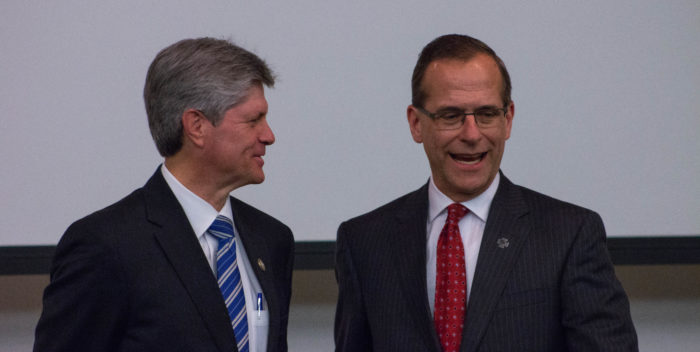Fortenberry Urges Cooperation Of Old and New Guard in Workforce
by Madison Pitsch
SEWARD, Neb. — Congressman Jeff Fortenberry urged the need for cooperation of the old and new generations in the workforce at his speech on Monday, April 23 at Concordia University Nebraska.
Fortenberry, Nebraska’s 1st Congressional District House representative, has been a U.S. Representative of Nebraska since 2005 and has introduced acts such as Renewable Fuels for America’s Future Act in 2010 and the SCHIP Plus Act in 2009, a healthcare initiative. He currently is part of the Appropriations Committee, which is art of the distribution of funds of the federal budget and is an “ardent supporter of family and life issues.”
He spoke of the generational disconnect in the workforce, how the older working generation stands on the fundamental characteristics of duty and ambition while the younger generation (more college students and young professionals) is more centered around building relationships and building empathy.
“Duty and ambition are a sort of cultural milieu in which I came up,” Fortenberry said. “My generation was not relational and not empathetic. We made a set of assumptions that all institutions that give rise to virtue and virtuous thinking that reinforced community would be there and we didn’t reinforce them. Your generation, though, has a heart and desires community.”
Fortenberry praised the relational and empathetic qualities of younger generations, but said that they lacked duty and ambition.
“Think about the possibility, if we could take the older generation’s commitment to duty and ambition and wed it with your beautiful gift of desire of relationship and being empathetic to others,” Fortenberry said. “That’s a vision for America.”
Fortenberry spoke of how the materialistic mindset of the older generation had caused a transactional mindset among consumers rather than a relational approach.
“If material things are unattached to their fundamental purpose of the well-being of persons, the well-being of community, then it’s just transactions,” Fortenberry said. “We see this (mindset) reinforced in our ideas of relativistic, utilitarian ideals that are now reigning.”
Fortenberry spoke of how the market and economy as a whole are suppose to interconnect us, and not just be a series of transactional interactions that do not form any kind of basis for relationship.
“The market interconnected us. It created interdependency,” Fortenberry said. “This is the point of rewedding duty and ambition and building up systems and tethering them to a deeper set of values like relationships and empathy. Interdependence, what’s good for the other person? That’s what you all want to do.”
Lastly, Fortenberry spoke of four main points to improve America. He spoke of economic inclusion, which means reviving the small-business, entrepreneurial sector. Creating a sense of economic inclusion connects consumers to producers, making the economy more relational. He spoke of foreign policy realism, meaning treating diplomacy as a relational effort rather than what can the U.S. gain from working with another country. He spoke of government decentralization, in that the key to society is a healthy community and family. He spoke of the federalization of problems, that Washington D.C. has all solutions to all the problems, but that’s just not the truth. Finally, he spoke of the conservation of social traditions and institutions.
“When we work hard to build systems and not lose sight of the purpose of the system, then we can reimagine the possibilities for America,” Fortenberry said.













